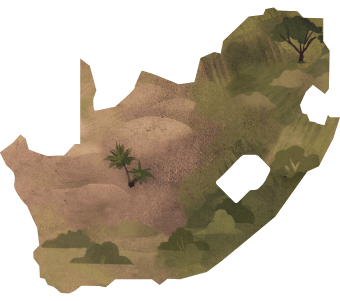South Africa: A window to hope in Sophiatown
Window of Hope: Mental health support for children and caregivers affected by HIV and living in poverty who have experienced traumatic events

Poverty and inequality
HIV prevalence is disproportionately high in Johannesburg’s informal settlements. Many children grow up as AIDS orphans with grandmothers or relatives in an environment surrounded by poverty, drugs and violence. Mental disorders and learning difficulties are therefore widespread.
Keyfacts about the project
-
Aim of the project
To enable traumatised children and caregivers who are affected by HIV and living in poverty to break out of the cycle of depression and helplessness and to take ownership of their lives.
-
Target groups
135 children and young people and 145 adults, many of whom have been traumatised by the effects of HIV, poverty, violence and exclusion.
-
Milestones
Creation of new groups of children and young people every year for the relevant group therapy sessions; collaboration with local clinics to train healthcare staff on topics such as stress, burnout and emotional challenges.
-
Methodology
Providing targeted individual and group therapy sessions to improve mental health, access to educational counselling and careers guidance services; and strengthening health services in the area of mental health.
Keyfacts about the project

South Africa

The project in a nutshell
Life in Johannesburg’s run-down centre and informal settlements is hard. Residents are traumatised by violence, physical and emotional neglect, displacement, social and economic exclusion, poverty and HIV/AIDS. This leads to widespread hopelessness, apathy, alcoholism and drug use. The loss of a whole generation of parents to HIV/AIDS means that many children have lost loved ones and are living with grandparents, aunts or uncles.
SolidarMed and local partner organisation, Sophiatown Community Psychological Services (SCPS), help children and caregivers who are affected by HIV and living in poverty to break the cycle of depression and helplessness and to take ownership of their lives.
Improving emotional wellbeing and developing external support networks
Children and caregivers who have no access to other psychosocial support can work through the effects of grief, illness, trauma and poverty through individual and group therapy sessions. Those who are too sick or broken to seek help themselves receive support through regular home visits.
New hope thanks to holistic support
Children and young people who have experienced trauma face various obstacles to learning that often lead to them dropping out of school. The combination of trauma and poor quality education means that 27% of children are unable to read after six years of primary school. In holistic psychosocial group therapy sessions, young people and caregivers affected by HIV are helped to recognise their own potential and to build a meaningful future.
Strengthening health services
Healthcare assistants and nurses receive targeted training in groups to discuss and tackle topics such as stress, burnout and emotional challenges in the workplace. The aim is to strengthen their emotional intelligence, both for their daily compassionate dealings with patients and in their personal role as caregivers.
More on the subject
Infectious diseases are not the only major threat in southern Africa. More and more people are also suffering from chronic diseases.





